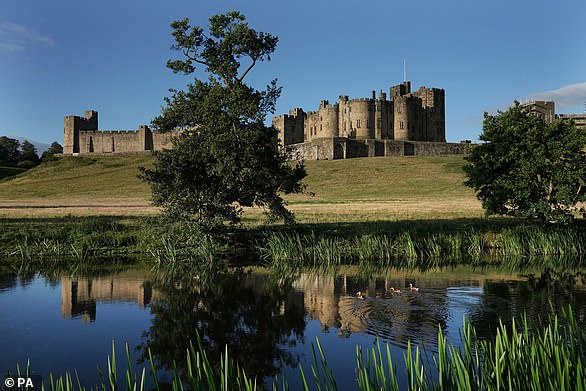Alnwick Castle, a 150-room, heavily crenellated, many-towered magnificence perched on a rocky outcrop above the River Aln in Northumberland, is the second-largest privately inhabited castle after Windsor — and it bears the scars of centuries.
There are musket pockmarks, made by Oliver Cromwell’s army, in the yellow sandstone.
In the main entrance, a maroon board offers Broomstick Training sessions on the very spot where Daniel Radcliffe had his first flying lesson in Harry Potter And The Philosopher’s Stone.
Ralph Percy, the 12th Duke, with the help of his energetic Duchess, Jane, transformed Alnwick into one of Britain’s most visited attractions.
The castle is exquisite — an assault of gilded ceilings, gold leaf, polished floors, gleaming swords and exquisite views over the Capability Brown-designed parkland.
There is an art collection, described as one of the finest outside the Royal Collection, which includes works by Turner, Titian, Canaletto, Van Dyck and William Dobson.
Alnwick Castle, home to the Duke and Duchess of Northumberland, reflected in the River Aln
Maintenance of the castle costs more than £1.5 million a year. Ralph and Jane had to make the castle work in the 21st century, as a home, a tourist spot and historical treasure, fighting against convention with a raft of visitor attractions, jousting sessions, gift shops and tearoom, and a few controversial decisions.
Over the years, the castle has featured as a backdrop for Blackadder, Robin Hood: Prince Of Thieves, Elizabeth, Mary Queen Of Scots, Transformers and the Christmas special of Downton Abbey.
But it was Harry Potter — and, in particular, the broomstick lessons and Quidditch matches — that really changed things.
‘There’s been a huge Harry Potter effect and we’re very grateful for it,’ says Ralph. ‘We do as much Harry Potter stuff as possible and it just doesn’t seem to die out.’
Over the centuries, Alnwick has had so many incarnations, lurching from good fortune to bad and back again with every new monarch.
During the Reformation and Counter-Reformation, the Percys abandoned Alnwick as the north was considered too dangerous.
By the 18th century they were back, and the place was abuzz. There was a staff of more than 200 maids, cooks, valets, butlers, grooms, ten priests and, at one point, even a resident executioner.
Now the staff seems to consist mostly of guides, shop assistants, cafe workers and gardeners. The Percys themselves have a daily as well as a chef.
